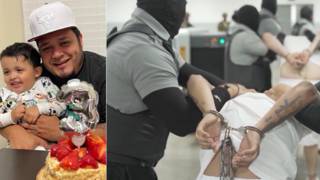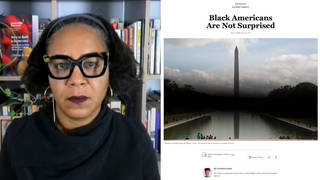
As Denver gears up for the Democratic National Convention later this summer, the federal government has allocated $50 million for security-related expenses connected to the convention. Denver has revealed that $18 million is budgeted for equipment purchases, but most of the details remain secret, prompting the ACLU to file a civil lawsuit. We speak with the legal director of the Colorado ACLU, Mark Silverstein. [includes rush transcript]
Transcript
AMY GOODMAN: Mark Silverstein, in this lead-up to the Democratic Convention, the ACLU has brought several lawsuits. Can you describe them?
MARK SILVERSTEIN: Well, sure. I think one of our suits is a lawsuit against the city and county of Denver and the Secret Service. And what we’re trying to do in this lawsuit is maximize the ability of the public and protesters to exercise their First Amendment rights during the time of the convention here in Denver. So it concerns such things as parade routes or demonstration routes and how close the public and protesters might be able to get to the convention site in order to communicate viewpoints or messages to the delegates that are coming to the convention.
AMY GOODMAN: Other lawsuits?
MARK SILVERSTEIN: The other lawsuits, one of –- the other lawsuits are under the Colorado open records laws. We know that Denver has been allocated $25 million — well, $50 million in federal money to reimburse it for security-related expenses. Denver has budgeted $25 million of that for purchases of equipment. So we have asked, under the Colorado open records laws, for information about the budgeting and expenditure of that public money. Denver has resisted providing any details, and so we do have a lawsuit trying to get disclosure of that information. Another of the lawsuits, also under the Open Records Act, just seeks the policy and procedure manual for Denver’s pre-arraignment detention facility, the city jail. It’s where recent arrestees are taken. We have concerns about how prepared Denver is for what might be mass arrests of protesters during the convention.
AMY GOODMAN: Is there a clearing out of the jails going on right now?
MARK SILVERSTEIN: I don’t know. I don’t know the answer to that. I do know that in discussions, almost a year ago now, the ACLU and other groups asked the city officials, could you — “In the case of minor violations of the law, how about giving someone a notice to appear in court rather than making a full custodial arrest that requires taking someone to a detention facility, processing them, and having them post bond?” The police response at that time is, “Well, that would require a change of policy. Our current policy,” we were told, was that for protests, they do not give citations. They make full custodial arrests.
A couple months later, there was a demonstration with eighty people sitting in the street in symbolic protest of Columbus Day. They were all arrested, taken to the city jail. And even after they had posted their bond money, some of them –- it took six, eight, ten, twelve hours to be released. And we’ve written to city, saying, look, if the city jail is overwhelmed by only eighty arrests of protesters, what’s going to happen if Denver, like New York City in 2004, has over a thousand people arrested? We’re afraid that the city jail just isn’t prepared for that many arrests, that that would overwhelm the staffing and infrastructure of the jail. So, we were trying to get the policies of the jail, for this and for other reasons. And the city essentially said, “No, we can’t release that to you for security reasons.” So, we filled that lawsuit under the open records laws and have already gotten most of the policies.
AMY GOODMAN: Well, we’re going to have to leave it there, but I want to thank you both for being with us, Mark Silverstein, legal director of the Colorado ACLU, American Civil Liberties Union, and Bruce Finley, a reporter for the Denver Post_, specializes in international affairs. We will link to your 9725077”>article on terrorism liaison officers on our website and also link to the ACLU at democracynow.org.












Media Options